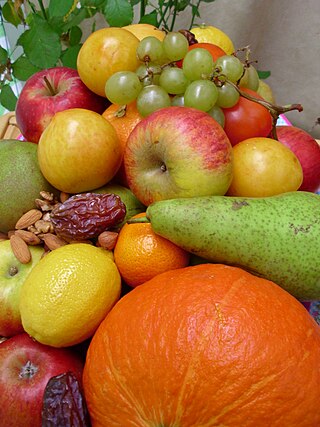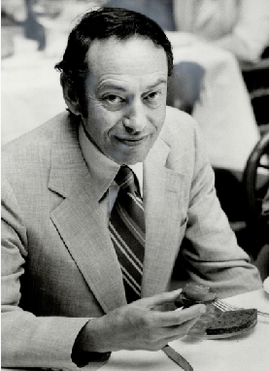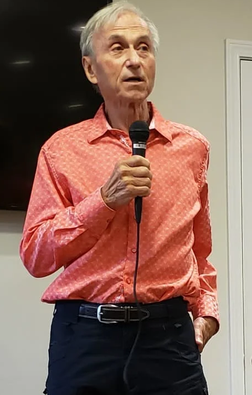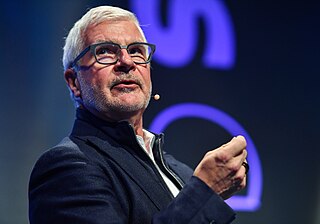Related Research Articles
Dieting is the practice of eating food in a regulated way to decrease, maintain, or increase body weight, or to prevent and treat diseases such as diabetes and obesity. As weight loss depends on calorie intake, different kinds of calorie-reduced diets, such as those emphasising particular macronutrients, have been shown to be no more effective than one another. As weight regain is common, diet success is best predicted by long-term adherence. Regardless, the outcome of a diet can vary widely depending on the individual.

Fruitarianism is a diet that consists primarily of consuming fruits and possibly nuts and seeds, but without any animal products. Fruitarian diets are subject to criticism and health concerns.

Joel Fuhrman is an American celebrity doctor who advocates a plant-based diet termed the "nutritarian" diet which emphasizes nutrient-dense foods. His practice is based on his nutrition-based approach to obesity and chronic disease, as well as promoting his products and books. He has written books promoting his dietary approaches including the bestsellers Eat to Live, Super Immunity, The Eat to Live Cookbook, The End of Dieting (2016) and The End of Heart Disease (2016). He sells a related line of nutrition-related products.

The Paleolithic diet, Paleo diet, caveman diet, or Stone Age diet is a modern fad diet consisting of foods thought by its proponents to mirror those eaten by humans during the Paleolithic era.
Orthorexia nervosa is a proposed eating disorder characterized by an excessive preoccupation with eating healthy food. The term was introduced in 1997 by American physician Steven Bratman, who suggested that some people's dietary restrictions intended to promote health may paradoxically lead to unhealthy consequences, such as social isolation, anxiety, loss of ability to eat in a natural, intuitive manner, reduced interest in the full range of other healthy human activities, and, in rare cases, severe malnutrition or even death.

A fad diet is a diet that is popular, generally only for a short time, similar to fads in fashion, without being a standard scientific dietary recommendation, and often making unreasonable claims for fast weight loss or health improvements; as such it is often considered a type of pseudoscientific diet. Fad diets are usually not supported by clinical research and their health recommendations are not peer-reviewed, thus they often make unsubstantiated statements about health and disease.

Low-carbohydrate diets restrict carbohydrate consumption relative to the average diet. Foods high in carbohydrates are limited, and replaced with foods containing a higher percentage of fat and protein, as well as low carbohydrate foods.

Raw foodism, also known as rawism or a raw food diet, is the dietary practice of eating only or mostly food that is uncooked and unprocessed. Depending on the philosophy, or type of lifestyle and results desired, raw food diets may include a selection of fruits, vegetables, nuts, seeds, eggs, fish, meat, and dairy products. The diet may also include simply processed foods, such as various types of sprouted seeds, cheese, and fermented foods such as yogurts, kefir, kombucha, or sauerkraut, but generally not foods that have been pasteurized, homogenized, or produced with the use of synthetic pesticides, fertilizers, solvents, and food additives.

A healthy diet is a diet that maintains or improves overall health. A healthy diet provides the body with essential nutrition: fluid, macronutrients such as protein, micronutrients such as vitamins, and adequate fibre and food energy.

Dean Michael Ornish is an American physician and researcher. He is the president and founder of the nonprofit Preventive Medicine Research Institute in Sausalito, California, and a Clinical Professor of Medicine at the University of California, San Francisco. The author of Dr. Dean Ornish's Program for Reversing Heart Disease,Eat More, Weigh Less and The Spectrum, he advocates for diet and lifestyle changes he believes can treat and prevent heart disease.

Nathan Pritikin was an American inventor, engineer, nutritionist and longevity researcher. He promoted the Pritikin diet, a high-carbohydrate low-fat plant-based diet combined with regular aerobic exercise to prevent cardiovascular disease. The Pritikin diet emphasizes the consumption of legumes, whole grains, fresh fruit and vegetables and non-fat dairy products with small amounts of lean meat, fowl and fish.

John A. McDougall was an American physician and author. He wrote a number of diet books advocating the consumption of a low-fat vegan diet based on starchy foods and vegetables.
William R. Davis is a Milwaukee-based American cardiologist, low-carbohydrate diet advocate and author of health books known for his stance against "modern wheat", which he labels a "perfect, chronic poison."

Mark Adam Hyman is an American physician and author. He is the founder and medical director of The UltraWellness Center. Hyman was a regular contributor to the Katie Couric Show until the show's cancellation in 2013. He writes a blog called The Doctor’s Farmacy, which examines many topics related to human health and welfare, and also offers a podcast by the same name. He is the author of several books on nutrition and longevity, including Food Fix, Eat Fat, Get Thin, and Young Forever.

Dave Asprey is an American entrepreneur, author and advocate of a low-carbohydrate, high-fat diet known as the Bulletproof diet, about which he has made claims criticized by dietitians as pseudoscientific. He founded Bulletproof 360, Inc. in 2013, and in 2017, founded Bulletproof Nutrition Inc. Men's Health described Asprey as a "lifestyle guru".

David "Avocado" Wolfe is an American author and conspiracy theorist. He promotes a variety of pseudoscientific ideas such as raw foodism, alternative medicine, and anti-vaccine sentiment. He has been described as "[o]ne of Facebook's most ubiquitous public figures" as well as an "internationally renowned conspiracy theorist" and a "huckster".

Clean eating is a fad diet based on the belief that consuming whole foods and avoiding convenience food and other processed foods offers certain health benefits. Variations of the diet may also exclude gluten, grains, and/or dairy products and advocate the consumption of raw food. Extreme versions of the diet have been criticized for lacking scientific evidence and potentially posing health risks.
Weight Watchers or WW is a commercial program for weight loss based on a point system, meals replacement and counseling.

The Lectin-free diet is a fad diet promoted with the false claim that avoiding all foods that contain high amounts of lectins will prevent and cure disease. There is no clinical evidence the lectin-free diet is effective to treat any disease and its claims have been criticized as pseudoscientific.
References
- ↑ Lehmann, Carolin (January 10, 2022). "The top 10 best-selling health, fitness and dieting books on Amazon". www.cbsnews.com. CBS News.
- 1 2 3 Rachel Hosie (5 January 2017). "Whole30 is ranked the worst fad diet, health experts reveal — The restrictive plan has been ranked the worst out of 38 diets". The Independent. Archived from the original on 10 April 2019. Retrieved 10 April 2019.
- 1 2 Miller, Jeff (24 March 2021). "Here's the skinny on the Whole30 diet that gave Dodgers' Justin Turner a svelte look". Los Angeles Times. Retrieved 24 September 2021.
- ↑ Rini, Jen (September 19, 2016). "Whole30: is the restrictive diet worth it?". The News-Journal. Archived from the original on 9 December 2017. Retrieved 28 September 2016.
- 1 2 3 4 5 Cho, Hannah (May 22, 2016). "Is the Whole30 diet right for you? Program has ardent supporters but some experts worry that it's too restrictive". Dallas Morning News. Archived from the original on 7 March 2018. Retrieved 28 September 2016.
- ↑ "Whole30: It All Starts with Food". WGN TV. June 28, 2015. Archived from the original on 11 February 2018. Retrieved 28 September 2016.
- ↑ Cahn, Megan (April 28, 2014). "Why the Whole30 Diet Is Taking Over Instagram". Elle. Archived from the original on 31 January 2018. Retrieved 28 September 2016.
- 1 2 Medaris Miller, Anna (December 15, 2014). "Should You Try the Whole30 Diet?". U.S. News & World Report. Archived from the original on 2 October 2016. Retrieved 28 September 2016.
- ↑ Urban, Melissa (23 April 2015). The whole30: the 30-day guide to total health and food freedom. Hodder & Stoughton. ISBN 978-1-4736-1955-5. OCLC 908510978.
- 1 2 3 Montag, Ali (3 April 2018). "The co-founder of cult diet Whole30 was once a drug addict — here's how she found huge success". CNBC. Archived from the original on 10 September 2018. Retrieved 10 September 2018.
- ↑ Davis-Flynn, Jennifer. "The Whole30: A Chat with Authors Melissa and Dallas Hartwig". Clean Eating Magazine. Archived from the original on 12 July 2015. Retrieved 28 July 2015.
- ↑ "Dallas and I are officially separating..." Melissa Hartwig on Instagram. June 24, 2015. Archived from the original on 2021-12-24. and "Melissa and I are officially separating..." Instagram. Dallas Hartwig on Instagram. June 24, 2015. Archived from the original on 2021-12-24.
- ↑ "Food Freedom Forever: Letting Go of Bad Habits, Guilt, and Anxiety Around Food". Publishers Weekly. Archived from the original on 14 October 2016. Retrieved 28 September 2016.
- ↑ Rogers, Katie (July 7, 2016). "Why Dieters Flock to Instagram". The New York Times. Archived from the original on 12 June 2018. Retrieved 28 September 2016.
- ↑ Johnson, Jon (May 9, 2019). "What to know about the Whole30 diet". Medical News Today. Archived from the original on 27 June 2019. Retrieved 27 June 2019.
- ↑ Willett, Megan (June 25, 2015). "Millennials are obsessed with Whole 30, the 'cultish' fad diet taking over Instagram and Pinterest". Business Insider. Archived from the original on 15 February 2018. Retrieved 28 September 2016.
- ↑ Fetters, K. Aleisha (November 20, 2013). "Best and Worst Health Trends of 2013: Worst: Whole30 diet". Health. Archived from the original on October 1, 2016. Retrieved September 29, 2016.
- ↑ Oliver, David (May 18, 2018). "Health Buzz: Why the Whole30 Diet Is Ranked So Low on the U.S. News Best Diets List". U.S. News & World Report. Archived from the original on 26 June 2019. Retrieved 27 June 2019.
- ↑ "Whole30 Diet". U.S. News Best Diet Rankings 2019. Archived from the original on 27 June 2019. Retrieved 27 June 2019.